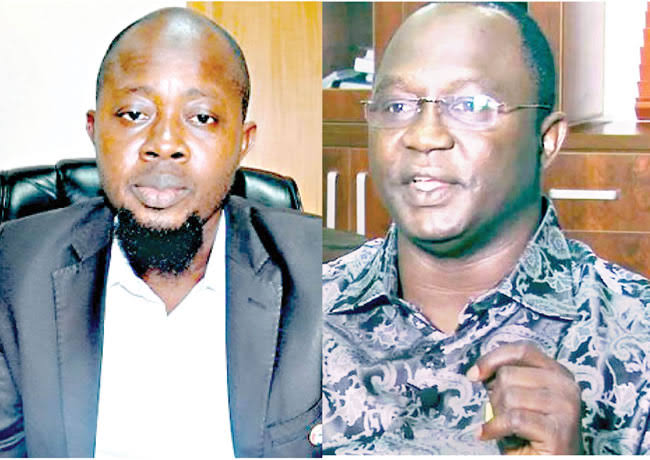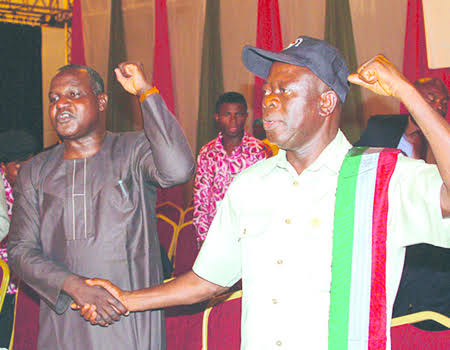RECLAIMING LABOUR PARTY: WHAT TASKS FOR NLC AND TUC?

By Ayo Ademiliyu Esq.
The Labour Party is receiving attention within the ranks of the labour movement again. This revival of interest in the Labour Party by the labour bureaucracy is after a long period of abandonment of the party by the labour bureaucrats.
Founded by the Nigeria Labour Congress in 2002 as Party for Social Democracy (PSD), it was renamed Labour Party in 2004 after being registered to stand as candidates in the 2003 General elections, after the successful battle up to the Supreme Court led by Chief Gani Fawehinmi for the registration of political parties by the Independent National Electoral Commission (INEC). The Party did not stand candidates in the 2003 General elections on the premise provided by the leadership that it is building the Party from below.
It soon became clearer what the Labour Party bureaucracy meant when it started receiving escapees from the mainstream bourgeois political parties in the lead up to the 2007 General Elections. This was what led to the manifestation and emergence of elements like Olusegun Mimiko as Governor of Ondo State.
Despite the character of his emergence, it ran in contrast to the disposition of many labour leaders at that time, particularly Adams Oshiomole, who as NLC President led up to seven general strikes but refused to run on the platform of the Labour Party for Governor of Edo State, which he settled for after abandoning the call on him to run for Presidency on the platform of the Labour Party.
After the 2007 General elections, the Labour Party moved more right-wing as many other rejected bourgeois parties utilised the Party as their last resort including elements like Ayodele Fayose. However, a major development occurred in 2010 which altered decisively the shape and character of the Labour Party. At the 2010 National Convention of the Party, the nomination fees were increased from the affordable amounts for workers and the poor to humongous amounts to be able to attract bourgeois elements.
Thus, the Labour Party became effectively a bride for the fat cats. The 2012 General Strike and Mass Uprising was a confirmation of a mass political party of workers oriented need to be built. On the other hand, Revolutionary Marxists in what is then the Democratic Socialist Movement, now also organise in the Movement for A Socialist Alternative, decided to exit the Labour Party given the bureaucratic obstacles placed on their membership, the right-wing shift and domination of the LP by moneybags to kickstart the Socialist Party of Nigeria.

In the lead up to the 2015 General Elections, the Party leadership tailed the Party along the lines of the People’s Democratic Party and its flagbearer, Goodluck Jonathan. The aftermath of the 2015 General Elections saw the phenomenal emergence of an opposition candidate, Muhammadu Buhari. This development also impacted the Labour Party as it further shrunk in profile given the misfortunes that trailed the Party leadership’s tailing of the People’s Democratic Party.
Succinctly, the major affliction of the Labour Party is that rank and file workers are not in the Party. All sections of the Labour bureaucracy also refrained from taking this step, knowing well the consequences. It is a death knell for them.
By the outcome of the 2019 General Elections, the new leadership of the NLC under AYUBA WAbba made frantic efforts to rein the Labour Party, which has now become a second eleven to the People’s Democratic Party under its influence and tailing of the All Progressives Congress.
This opened up a titanic legal and Political battle with a Party leadership entrenched in “legality” with the Independent National Electoral Commission (INEC). The death of Alhaji Salaam, the former National Chairperson did not abate the conflict. The emergence of Abure as the Party’s National Chairperson under controversial circumstances renewed the battle between the NLC bureaucrats and the Party bureaucrats.
The coming of the new TUC leadership offered a new wave into the whole scenario. A level of seriousness exhibited by the Political Commission of the Trade Union Congress opened up a deep exchange between the present Labour Party leadership and the Trade Union Congress.
In the last quarter, the two labour centres have held two Political Conferences on the question of the Labour Party. This is not coincidental. It is a reflection of the magnitude of pressure from the rank and file and the enormity of the crisis of the moment.
There are plans to unveil the Labour Party as Party for workers to join at Joint May Day Mass Rallies on 1st May 2022. The Trade Union Congress (TUC) initiated the Political Education Implementation Committee, which drew in left forces including representatives of the Movement for A Socialist Alternative. The Political Commission has also been inaugurated.
The seriousness of the TUC needs to be replicated by the NLC. The Joint May Day Mass Rallies is the first step. There is a need to allow rank and file workers to stand as candidates in the Party. Exorbitant nomination fees which is the prevailing order of things in the dominant bourgeois parties, All Progressives Congress and People’s Democratic Party should not be allowed in the Labour Party.
The question of the economic programme of the Labour Party needs to be addressed too. As a Revolutionary Socialist Organisation, we advocate that the Labour Party adopts a clear cut socialist programme.
The Labour Party needs to also be run as a FEDERAL party of left platforms, socialist parties and youth organisations such as the Labour Party of the United Kingdom for deregistered and unregistered left and radical parties such as the Socialist Party of Nigeria, Democratic Alternative, Movement of the People as well as registered ones such as the People’s Redemption Party and African Action Congress (AAC) to participate in a united front of a broad working people’s political alternative against all the parties of the moneybags and oppressors.
On the whole, the current rank-and-file workers ‘ mobilisation into the Labour Party would impact the character of the 2023 General elections and the aftermath. The entire situation ahead is chaotic and complex. A right-wing military intervention may trail the post-election tensions. This may only temporize the rank and file working class POLITICISATION but it cannot halt. A season of mighty waves of struggles lies ahead.
